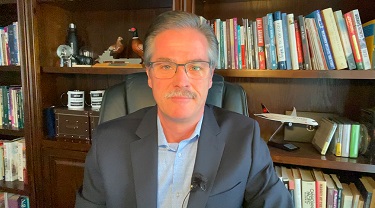2020 had barely begun when the surprise of the year hit. Typically, December sees the EDC Economics team debating the year’s economic or geopolitical head-turner, weighing options carefully before publishing our final choice. This year was no contest. COVID-19 hit the newswires in January, initially waved off as a local Chinese concern. Little did we know it would swamp 2020, not once, but in three giant waves of infection. How has this redefined our world, and what are its lasting effects?
First, it redefined recession. True, there were two back-to-back quarters of economic decline, fulfilling the standard recession definition: China’s first-quarter shutdown nudged global output down slightly, followed by the huge hit in the second quarter. The game-changer this year was the speed with which output fell, the depth of the plunge, and the planetwide reach of the problem. Many claimed that in terms of magnitude, this was more like an economic depression. For all of these reasons, what hit us this year has little historical precedent.
Second, 2020’s debacle redefined stimulus. Not the types of stimulus; we had seen this year’s fiscal and monetary measures before. Again, it was the sheer scale of measures that put this year’s actions in the history books, and also the speed of implementation. Country after country poured untold amounts of public money at the problem, desperately trying to keep economic activity going as businesses shut their doors. At the same time, those with room lowered interest rates to rock-bottom, then pulled out the stops on quantitative easing to ensure adequate liquidity in the system. On that note, central banks greatly expanded the list of assets they would purchase.
Unfortunately, we didn’t have lots of surplus cash to fund the public spending; it had to be borrowed. Deficits have ballooned everywhere with little regard for how it’s all going to be paid back. Gone for the moment are sustainable debt and deficit targets, even among their staunchest guardians. Europe considered a 60% debt-to-GDP ratio as manageable in the long term. Today, not even France and Germany are close. The United States left that marker in the dust a decade ago, and when the dust has settled on COVID-19, according to the Organisation for Economic Co-operation and Development (OECD) they’ll be north of 130%. What’s even more unsettling is that the U.S. is no anomaly; everyone has a COVID-19 debt deluge story to tell. The pandemic has redefined acceptable public debt limits—for now.
Such drastic actions were intended to stop the pandemic, fast. It did, but only temporarily. We’ve now seen an alarming third wave of infections, and a second serious, albeit partial, shutdown of activity that is again compromising growth. Governance has varied from country to country, and no one can boast a superior approach. Hopes seem to be resting in large part on development of a vaccine. Fast-track programs have produced two, and possibly three viable options, and are setting land speed records for approval. Processes that usually take years are now down to months or even weeks. It seems that the pandemic is also redefining the research and regulatory worlds.
Let’s face it, COVID-19 has redefined life. Social isolation has become the norm, and will radically alter our upcoming holiday celebrations. Technology has made digital business ubiquitous, and left behind a lot of the analog set. The permanence of these changes remains to be seen. The social toll is great, and human behaviour suggests that, like the post-SARS period, there will be a grand return to normal interaction in school, work and travel. Even so, some businesses that can have gone virtual, selling real estate and permanently setting up staff at home. Depending on how long the pandemic lasts, virtual work, education, leisure and social interaction could be more the norm.


















